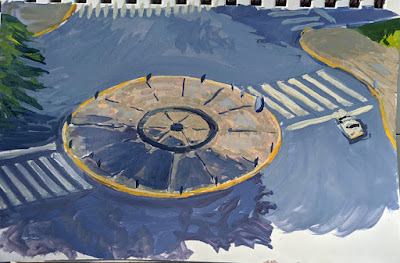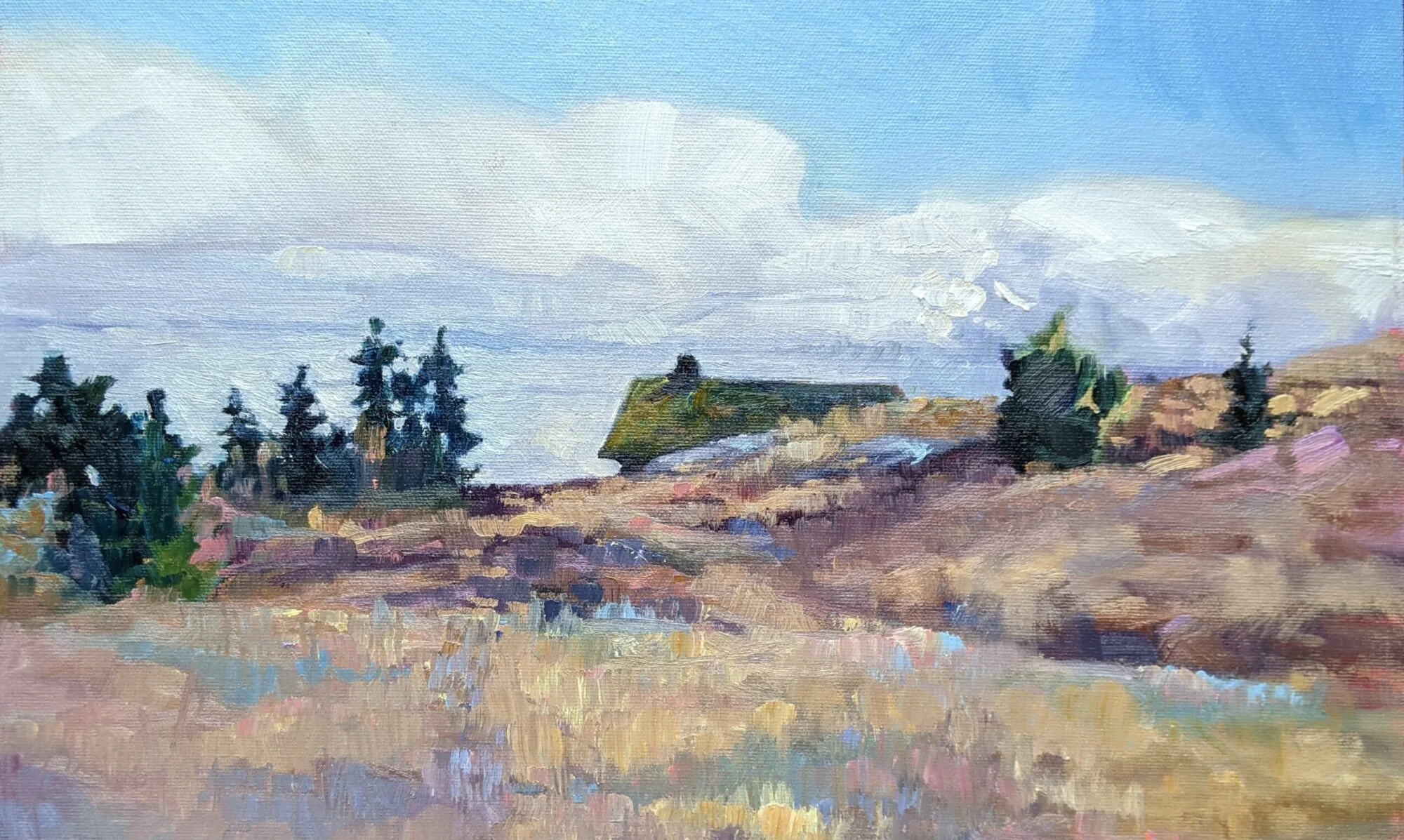There is restorative power in art, which is why so many people are drawn to it.
 |
| Empty plaza with police car, gouache on paper, Carol L. Douglas |
American corporations are masters of assembling prepared foods into a simulacrum of cooking. The bar at the Hilton is the only place to buy meals, and what’s on offer are ersatz dinners. Although we’re trying to avoid them as much as possible, there are no cooking facilities in our rooms. Even the minibars have been torn down due to coronavirus.
We decided yesterday that we needed breakfast, so we took a seat in the lobby and ordered coffee and omelets. We were not far from where we’d been seated the night before. From my angle, I got a clear look at the area. A lone lump of cheese remained on the table. Underneath, the carpet was littered with bottlecaps and crumpled cocktail napkins. There were crumbs on the leather upholstery. The hotel crew might be spraying surfaces with alcohol, but if they’re not also wiping, picking up, and vacuuming properly, their efforts are wasted.
 |
| We’re sharing space with airline crews. |
As we ate, another large air crew arrived. This one was from Air France, and they immediately colonized every table around us. France has (as of last night) 45,000 cases and 3000 deaths from coronavirus. An Edelweiss Air crew was already here, but, until then, it had been easy to ignore them. That was folly, however; Switzerland has one of Europe’s highest rates of recorded coronavirus.
The Hilton is Argentina’s plague pokey and we’re there because we’re foreigners. But we came to Buenos Aires certified as healthy. Our goal is to remain that way. Airlines are grounded right now because they’re vectors for the spread of this disease. We don’t hate these crews, but we’re afraid to share space with them. At the same time, we’re also eagerly anticipating the arrival of an Eastern Airlines crew, because that brings us one step closer to heading home.
 |
| Apartment buildings across the street from us. I feel blessed to not live in a high-rise. |
The answer is to insulate ourselves as much as we can.
Jane Chapin and I ventured out in search of food that we can eat in our rooms. This time we went to a different
supermercado. If we didn’t strike gold, we at least found fresh fruit, vegetables, bread and cheese. We came home with four heavy bags and formed an assembly line to wash it. Last night our crew dined on tuna-fish sandwiches, fruit, palm hearts and mushy peas. After the horrid bar food, it was divine.
 |
| Painting from the window with Lynn Mehta and Kellee Mayfield. Photo courtesy Douglas Perot. |
Jane has jiggered our accommodations so that our group has two rooms facing the street. That gives us small windows on the world where we can take turns drawing and painting.
Kellee Mayfield shared her gouache with
Lynn Mehta and me. I left my watercolor and gouache at home for reasons of space; I will never travel without one of them again.
I was relieved and comforted to have a brush in my hand, although my painting is as bleak and raw as my psyche. There is restorative power in art, which is why so many people are drawn to it, and why I believe it’s important that everyone should have the opportunity to do it. While we Christians believe in the Resurrection, we not immune to the pain of loss.
 |
| You have to know the password to get in. Photo courtesy Douglas Perot. |
I had intended to force myself into routine yesterday: drawing first, followed by a few hours of paperwork. I wasn’t able to drag myself into compliance. I went to bed early, foolishly flipping around Facebook before I dropped off. There I saw something that horrified me. An old friend, Wayne Potter, died yesterday, cause unknown. I frantically texted my brothers in the hope that it was a mistake. Alas, it was not. Two deaths in two days was more than my old soul could bear. I cried myself to sleep.





